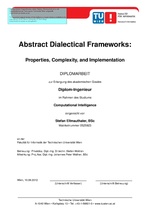Abstract Dialectical Frameworks: Properties, Complexity, and Implementation
Aus International Center for Computational Logic
Abstract Dialectical Frameworks: Properties, Complexity, and Implementation
Stefan EllmauthalerStefan Ellmauthaler
Stefan Ellmauthaler
Abstract Dialectical Frameworks: Properties, Complexity, and Implementation
Master's Thesis, Technische Universität Wien, Institut für Informationssysteme, 2012
Abstract Dialectical Frameworks: Properties, Complexity, and Implementation
Master's Thesis, Technische Universität Wien, Institut für Informationssysteme, 2012
- KurzfassungAbstract
Over the last two decades the interest for Abstract Argumentationsteadily raised in the field of Artificial Intelligence. The concept of Dung's Argumentation Frameworks (AFs), where arguments and their relations are represented in a directed graph-structure, is a well-known, simple, and powerful concept. This framework is used to find acceptable sets of arguments, which have specific properties (e.g. being conflict free), defined by several semantics. Recently Abstract Dialectical Frameworks (ADFs) were introduced, a generalization of Dung's approach, to overcome the limitation of attack-relations being the only type of native relations. To reach this goal, in addition to the relations, total functions are used to decide the acceptance of an argument. These functions are so called acceptance conditions. Due to the high expressiveness of this newly proposed theory, some semantics were only generalized for the restricted bipolar ADFs yet. This work will give an exhaustive overview on ADFs. The restriction to bipolar ADFs for some of the semantics is not desired, so we try to develop a solution to gain the generalized stable model semantics. This semantics is particularly important because the other semantics which are restricted to bipolar ADFs, depend on stable models. To gain such a generalization, we will try to connect the foundations of ADFs to other fields of computer science. So we may relate subclasses of these fields to the bipolar ADF to overcome this obstacle. This connection also makes ADFs more accessible to other fields of computer science. We will concentrate mainly on the introduction of the alternative representation of propositional-formula ADFs (pForm-ADFs), but we will also show that ADFs can be represented as hyper-graphs. Based on the new representation a transformation from ADFs to pForm-ADFs, together with a generalization of the stable model semantics will be presented. In addition some properties between semantics will be investigated and an overview of complexity results, enriched with new ones is given. Currently there is no software system available to compute semantics for ADFs. So in addition to the formal results we also present an Answer Set Programming (ASP) based implementation to solve these highly complex computations. We will also present preliminary empirical experiments. - Weitere Informationen unter:Further Information: Link
- Forschungsgruppe:Research Group: Wissensbasierte SystemeKnowledge-Based Systems
@misc{E2012,
author = {Stefan Ellmauthaler},
title = {Abstract Dialectical Frameworks: Properties, Complexity, and
Implementation},
year = {2012}
}
